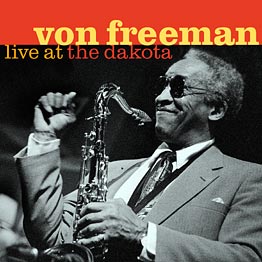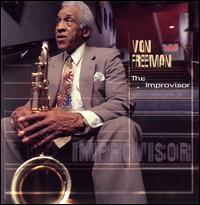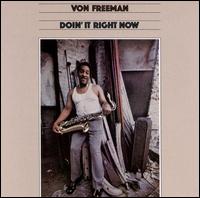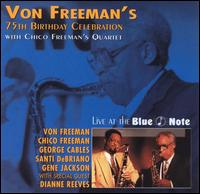

Courtesy of Von Freeman

Premonition

Premonition

Koch

Half Note
A FIRESIDE
CHAT WITH VON FREEMAN
There
are unsung heroes among us. In football, Emmitt got a lead-in from every
major pre-game show, but it is a little known Priest Holmes (KC) and a
practically unknown Deuce McAllister that are putting Marshall, Ricky,
and Emmitt to shame. While Derek Jeter, Barry, and A Rod garnered much
of the headlines, a little known shortstop (David Eckstein) from a small
market team (Angels), in a practically unknown town (Anaheim), was one
of the major league leaders in on base percentage. And until the aftermath
of 9-11, giving a hand to firefighters and law enforcement was an afterthought.
There are heroes among us and jazz is no exception. For years, Von Freeman
was recognized primarily for being the father of Chico Freeman (or brother
of George Freeman). Of Chicago tenors, the elder Freeman polls behind
Gene Ammons, Johnny Griffin, and Fred Anderson. The Improvisor, the tenor's
latest from Premonition, is one of the finest tenor albums I've heard
in years (and any Roadshow passenger knows I like some heavy tenors).
I spoke with Freeman from his home about his legacy, his new record, and
his recent resurgence, as always, unedited and in his own words.
FRED JUNG: Let's start from the beginning.
VON
FREEMAN: Oh, I was very young. I'm back from the victrola. You might be
too young to remember that, Fred, the victrola. But a lot of homes had
that where you played these old-fashioned, round records, the really kind
of heavy ones and my father had a whole bunch of them. I used to be the
winder. You see, Fred, you had to wind them up for each record and I remember
that. I must have been about three years old and I'd climb up on the stool
and get up there and wind it up. I listened to all these records and that
is when I first became very interested in playing music. I listened to
this music and I found out it was the saxophone and I asked my father
because he had no idea that one day I'd be playing the saxophone. That's
when I really started. It was just before I came out of grade school,
like sixth grade. I really started playing on back porches and beating
on garbage cans and that type of thing and just making sounds. But the
neighborhood I was in, there was a bunch of those kinds of bands. We were
always being run off somebody's back porch. My father had a lot of Louis
Armstrong. He had quite a few Louis Armstrong records. Louis had just
started recording when I was very young and he played them all the time.
He had three or four people that he played all the time and I would be
doing the spinning and that caught my attention. Of course, it could have
been my father was so crazy about jazz music. Actually, he liked all type
of music. Literally, I took the needle on the victrola, it is shaped almost
just like a saxophone. It really is. Of course, my father loved this piece
of furniture. It really was at that time. When he went to work, I would
take the head off and make a mouthpiece out of tissue paper and I was
running around the house playing that thing and when he did come home
one day and catch me with that thing, I thought he was going to go off
because my mother had warned me that he might throw me out the window
or something if he discovered this thing (laughing). It was very disruptive.
That is how it really started out and that is a true story. I actually
put some holes in the head of this victrola that held the needle and was
running around the house blowing on it. My father said that we better
get him a horn.
FJ: You are self-taught.
VON
FREEMAN: You know, Fred, it was really a mistake that I started that way,
but a lot of kids over in the ghetto started like that. You know, I started
out without any lessons of any kind. I remember once, a fella gave me
a piece of paper that had the fingerings to the saxophone to it and that
is how I actually figured out the fingering. But I more or less started
that way. I was just one of the many kids in the neighborhood that did
that on different instruments. We all had something we were beating on
without instructions, which of course is not that good to do. That's the
way most of the kids in the neighborhood that I was running with, we all
were heavily into music and most of us made instruments. It is very interesting
how they made bass. They used to take a tub and a 2 X 4 and string and
everybody knew how to make that one.
FJ: Was a Chicago sound evident?
VON
FREEMAN: Yeah, I guess if there is one, on the saxophone especially, it
is a collaboration of Lester Young and Coleman Hawkins I would say. Those
two were very popular in Chicago. I remember as a young kid, I used to
go see Lester Young with Count Basie and Hawk would come through town
and play with different trios with different clubs. In fact, he was a
very good friend of my father's. I actually first met him. One day, my
father told me about Hawkins working somewhere. It was near the house,
actually, about two or three blocks from where we lived. My father was
on duty and he used to go over. You see, Fred, he was a Chicago policeman.
Sometimes he would make extra money by being a bouncer at a nigh club.
That was very popular in that era. I had actually met Coleman Hawkins
when I was very, very young. Of course, later on, I got to know him and
even played with him a couple times.
FJ: Rather than leave for New York, you remained in Chicago.
VON
FREEMAN: It was just happenstance really. But you know, speaking of that,
there is a bunch of musicians around here that probably would be better
known and might have become stars had they gone on to New York. New York
had a lot of the record companies, most of the record companies, especially
main record companies and they would push their clients and that made
all the difference in the world. So a lot of guys went on to New York
and made big names and perhaps I could have done that also, but it was
just happenstance that I stayed around Chicago.
FJ: Regrets?
VON
FREEMAN: No, not really. I've become very popular in the last couple of
years (laughing). I guess it all evens out, if you look at it that way.
Now that I am eighty, I can look back and I've been through many trials
and tribulations that the average musicians go through. For instance,
both Fred Anderson and I, I think what caused us to survive was both of
us have been what they call outside players. Fred is much more than myself.
I just think everything sort of evens itself out. Like I said, if you
happen to stay around long enough. Of course, even if you don't, the people
that like you will come. I think for years and years and years, a lot
of New York stars were pushed more harder than Chicago people. And then
a lot of people from here went to New York. So we lost a lot of people.
New York is still the leading capital of jazz music.
FJ: The Apartment Lounge, where a portion of the new record was recorded
live, has been a regular night.
VON
FREEMAN: Well, this time, I've been at The Apartment three or four times,
but this time, in 1982, I started there. I was just going in there because
the lady who booked me, she was booking The Apartment at the time, different
little combos, duets and things. She asked me if I would come because
one of her stars couldn't make it and I went in and I went in on a Tuesday
and I played on Tuesday and she said if I could come back next week and
I went back and it has been about twenty-one years.
FJ: The Improvisor, befitting title.
VON
FREEMAN: Well, it is so kind of you to say. I've done it all my life really.
FJ: Jason Moran plays piano on a couple of tunes and a guitarist is featured
on another handful.
VON
FREEMAN: Actually, I went into The Apartment about twenty-one years ago
with a piano group, piano, bass and drums. I had piano for maybe fifteen
years and I lost a lot of piano players. I lost about seven during that
tenure and I said that maybe I should try going in a different direction
because I never could get a real piano, not that an electric piano is
not real, but I'm speaking of an acoustic piano. I always did miss that
and finally, I said that maybe I will just go with an electric guitar
because it was so hard to find somebody for the kind of money I was playing
to bring their own piano. The guitar is a little easier to carry than
an electric piano and it sounded OK to me and so that is the way I ended
up. I finally found a good one in Michael Allemana and a very good bassist
named Jack Zara and a very good drummer named Michael Raynor (all on the
album). They have all been with me for quite a while now.
FJ: You play solo on the opening "If I Should Lose You."
VON
FREEMAN: Well, playing solo, I will tell you, Fred, because on this latest
recording, I did this tune and most of the things to me happen very, very
weirdly. Most of the time when I play solo and I've done that on a few
of my recordings, it is done accidently. I remember one record I did that
and the piano player didn't come back in time. He went somewhere, I guess
out to eat or something and I started playing and it was recorded (laughing).
On this last recording, the way that happened was Jason Moran and I were
playing a duet. I didn't even know that we were going to do this because
I never play duets. I featured him and I went to the mike and said that
it is time to introduce this wonderful piano player from New York and
I said that I am going to take the walk and Jason played and the moment
he got done playing, he said that he was going to feature this wonderful
saxophone player and he was going to take a walk and he was gone and left
me standing out on the stage, me and this saxophone. He was walking off
the stage (laughing) and I just told the crowd that I would do the best
that I could do and that's when I played this tune that happens to be
on this recording. It was just happenstance and I was so fortunate that
it turned out OK because you play by yourself, you are really taking a
big risk because you may lose track of the melody and there is really
no time, so you may start faltering with the time and you may forget some
of the chords. You have to have it all yourself.
FJ: Turned out to be the best tune on the album.
VON
FREEMAN: Well, I was very fortunate. Thank you very much.
FJ: Rahsaan Roland Kirk produced your first album.
VON
FREEMAN: Rahsaan Roland Kirk, oh, that was sort of interesting because
I was traveling. I have done a little traveling, but it was always mostly
overnight or on the weekends and then I would be right back home. I happen
to go to Toledo if I remember it and I know it was somewhere in Ohio,
where he is from I think. His dad or somebody, uncle or some grown up
brought him to see me and he was a little guy. He must have been eleven
or twelve, but he was already great because somebody had taken me around
to see him (laughing) that I had to see this little genius and he was
with some band that was jamming and he was playing two or three horns
at once and doing circular breathing and all that stuff at his age and
he really had it together. Later on, he looked me up. He heard I had been
by to see him and he said that his uncle brought him by and he listened
to me and where was I from. I told him Chicago and he asked me my name
and he said that he had been taken to see most of the great horn players,
but he had never heard of me and he made the staunchest statement that
one day he was going to be famous and he was going to look me up and see
that I got recorded. Well, he was rather precocious of course, but I said,
"Oh, sure," and everybody in the band laughed a little bit.
But you know, that guy, years later, looked me up right here in Chicago
and actually asked me if I remembered him. He was a big star at that time
and he had this big hit record, Three for the Festival, where he is on
there playing three instruments, four, five instruments at once and he
was like a whole band up there. He said he wanted to take me on to New
York because he was leaving and do you know that he asked me who I wanted
and I told him a couple of guys and he said that he had to have two from
New York and so I told him and I had a piano player, John Young. We worked
on and off for fifty years or so. We went off to New York because he called
me the next morning and he fulfilled what he said and I went to New York
and that is where I made this recording. Of course, it didn't do anything,
but they tell me now that it is doing very well.
FJ: KOCH reissued Doin' It Right Now.
VON
FREEMAN: Yeah, that's right.
FJ: You did a live record with your son, Chico at the Blue Note in New
York (Half Note Records).
VON
FREEMAN: Yeah, it is always a pleasure and thrill to work with my son.
We made one or two other things for different labels. He was a very smart
kid and he had moved onto college as a mathematician. He won a scholarship
for it to Northwestern, here in Chicago, which is a big time school. I
thought surely, although he was playing trumpet, I didn't think he was
really serious. I thought maybe he would put it down. I used to play trumpet
for years and he went down in the basement and found one of my old trumpets.
The thing was all beat up and battered, but he actually got it in the
band there at school and changed his curriculum around. It was mathematics
and now he was playing the trumpet, but I had another surprise coming
because after he had been in the band for about two months, which I was
very surprised that he made that band. He was fourth trumpet, but still
he made the band. The next thing I know, he came home with a big case
and I asked him that that wasn't a saxophone and he said, "Oh, yeah,
daddy. I think this is where I really belong." I just looked at him
and the next thing I know, the band went to Brazil and they won honors
and he won honors as the best soloist. He went onto New York and that
is where he has been ever since. That was 1971. I just kind of tipped
my hat to him and said, "Go ahead Chico."
FJ: Do you get many age references being equated with your playing?
VON
FREEMAN: Oh, sure, I run into it all the time. The only thing is, I have
been really blessed and really, just really, really lucky that my health
is as well as it is. A lot of young guys are stunned I blow like this
and I say, "I think I blow harder." It also has to do with I
think I play more instead of just blowing now, along with the knowledge
of how to conserve your energy. It is much easier to play now than at
one time. For one thing, I didn't know much about mouthpieces or reeds
or horns or anything and as you get older, Fred, you learn a lot of things
that makes the playing much, much easier. So I can blow pretty strong
and long and loud and I can still dance if I want to and I can still move
around. I think a lot of people come to see if I'm going to faint or something
(laughing).
FJ: Your latest sounds better than your first.
VON
FREEMAN: (Laughing) Well, thank you very much, Fred.
FJ: And in the end?
VON
FREEMAN: Well, truthfully, that I tried to be a nice guy and I tried to
help the younger guys and gals. I do it all the time, but it is by osmosis
really because I don't claim to have taught anybody anything. I came up
with great saxophone players and nobody ever told me anything. If you
respect what they are doing, you do pick up things. A lot of kids come
around me now and if I know the answer, I tell them. When they ask how
they are going to sound like me, I tell them I could sound like them if
I tried. I am just telling them the truth. It is a singular music, jazz
music is. You must find yourself. That is the only way you are really
playing jazz. You want to enlighten the world with the touch that you
have.
FJ: And Von Freeman has done his part.
VON
FREEMAN: Oh, thank you. And tell your audience, I love them.
Fred Jung is the Editor-In-Chief and has a hanging chad. Comments? Email
Him